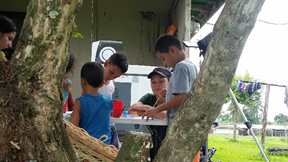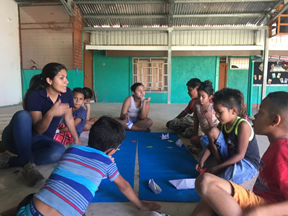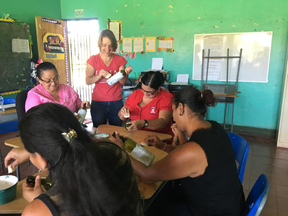Since May 2017, the Center for Research and Teaching in Education (CIDE) of the National University and the Infants' Environmental Health Program have intensified their collaboration in the development of various activities for the cognitive development of children in different communities of Matina. Starting in February 2018, this alliance has grown with the development of the graduation project by students Jennifer Gutiérrez and Reichel Rodríguez, from the bachelor's in special education with an emphasis on Pedagogical Projects in Inclusive Contexts program of the Basic Education Division. The thesis is being carried out within the context of the Intersectoral Strengthening Project for the Integral Attention to the Development of Girls and Boys in Costa Rica by CIDE.


The graduation project is titled: "Promotion of inclusive pedagogical interactions between school and community: building a dialogical proposal in two communities of the canton of Matina for the benefit of boys and girls," and its objective is to promote inclusive pedagogical spaces between school and community, through dialogical participation in two communities of the canton of Matina for the benefit of boys and girls.
During the first months of 2018, students Jenny and Reichel focused on the diagnostic phase of their project, in which they sought to understand the population of the communities of Lomas del Toro and Bananita (Santa María), generate initial contacts and connections to subsequently develop their work in the community. In this phase, the students carried out different activities such as dynamics and playful strategies in both educational centers, where children and parents have been learning through games. Several field trips were made where the contact of some children with their teachers and families could be observed. These activities, both in the diagnostic phase and in the fieldwork phase, have been and will be accompanied at times by education students, from the Diploma level to Master's.
During this diagnostic stage, the students have had the opportunity to get closer to some families of the children from the ISA Program and their schoolmates, encouraging playful activities both with their families and within the educational centers, which helps improve the learning of these children. Also, strengths and areas to work on in each community were identified, as well as their respective particularities, making them diverse spaces separated from each other by quite marked dynamics. In addition, after the diagnostic phase, learning has been constructed both from the communities and from the theses of Jenny and Reichel, as it has allowed them quite broad professional growth.

In the second semester of 2018, they have been carrying out the fieldwork of their projects, aiming to achieve the established objectives through collaborative work with parents, children, teachers, individuals of all age groups, and school staff. Activities will be conducted during weekends in school spaces to develop social skills and encourage new community proposals. In this way, the project aims to provide these communities in Matina with more tools to organize themselves and manage solutions for issues or different situations that affect them.


